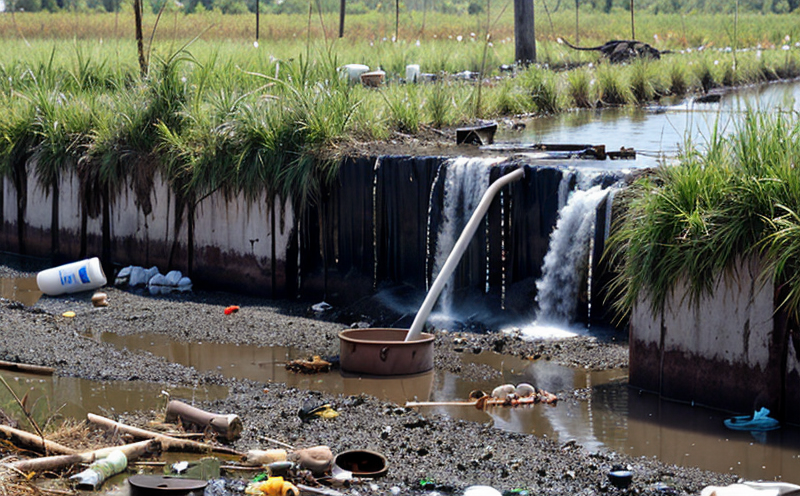Soap Pollutant Testing
The testing of soap pollutants is a critical aspect in ensuring environmental compliance and product quality. This service involves a comprehensive evaluation of chemical constituents in soaps, which can have significant impacts on water bodies if improperly managed. Understanding the chemical composition of these products helps in identifying potential pollutants that could harm aquatic ecosystems.
Typical pollutants found in soap include surfactants such as sodium lauryl sulfate (SLS), synthetic fragrances, dyes, and preservatives like methyl paraben or propyl paraben. These compounds can be harmful to fish, amphibians, and other aquatic life when released into water bodies. The testing process aims at quantifying these pollutants based on international standards such as ISO 18436 and ASTM D790.
Specimen preparation for soap pollutant tests is a meticulous process that begins with the collection of representative samples from various batches or production runs. Samples are then carefully analyzed using advanced analytical techniques like High-Performance Liquid Chromatography (HPLC) and Fourier Transform Infrared Spectroscopy (FTIR). These methods provide precise measurements of specific pollutants, ensuring accurate results.
Once tested, the data is compiled into detailed reports that outline compliance status against relevant regulations. This information is invaluable for quality managers who need to ensure their products meet both internal standards and external regulatory requirements. Compliance officers can use this data to make informed decisions about product reformulation or process adjustments necessary to avoid non-compliance issues.
R&D engineers benefit from soap pollutant testing by gaining insights into how different chemical formulations affect environmental impact. This knowledge can guide them in developing more sustainable products that minimize harm to the environment while maintaining efficacy and consumer satisfaction. For procurement teams, this service offers assurance regarding the quality of raw materials used in production.
The importance of this testing cannot be overstated given its role in protecting our environment. By identifying pollutants early in the production cycle, companies can take proactive measures to reduce their ecological footprint. This not only helps them comply with environmental laws but also enhances their reputation among environmentally conscious consumers.
- Compliance with ISO 18436 and ASTM D790
- Precision measurement using HPLC and FTIR
- Representative sample collection from multiple batches
- Detailed reporting on pollutant levels and compliance status
Eurolab Advantages
EuroLab offers unparalleled expertise and state-of-the-art facilities dedicated to soap pollutant testing. Our team comprises highly qualified chemists and environmental scientists who possess deep knowledge in this field. Leveraging our advanced analytical instruments, we provide accurate and reliable results that meet international standards.
One of the key advantages of EuroLab is our commitment to innovation. We continuously invest in cutting-edge technology and methodologies to stay ahead of industry trends. This ensures that we can offer comprehensive testing services even as regulatory requirements evolve.
We pride ourselves on delivering exceptional service tailored to each client's unique needs. From initial consultation through final report delivery, our goal is to make the entire process seamless and efficient. Our dedicated team stands ready to assist with any questions or concerns you may have during this time.
Environmental and Sustainability Contributions
EuroLab's soap pollutant testing plays a vital role in promoting environmental sustainability by helping companies minimize their ecological footprint. Through precise identification and quantification of pollutants, we enable businesses to take proactive measures aimed at reducing harmful impacts on the environment.
In addition to compliance with environmental laws, this service also supports broader sustainability goals such as resource conservation and waste reduction. By identifying areas where improvements can be made in product formulations or manufacturing processes, companies can contribute positively towards global efforts to protect our planet for future generations.
Competitive Advantage and Market Impact
EuroLab's soap pollutant testing service provides a significant competitive advantage by offering comprehensive insights into the environmental impact of soaps. This knowledge allows companies to differentiate themselves in the market through innovative, environmentally friendly products.
- Provides detailed information on pollutant levels for informed decision-making
- Ensures compliance with stringent international standards
- Supports continuous improvement initiatives within R&D departments
- Facilitates better supplier selection and material specification decisions in procurement teams
- Promotes sustainable practices, enhancing brand reputation among environmentally conscious consumers
The ability to demonstrate robust environmental stewardship through rigorous testing can significantly enhance a company's market position. It fosters trust with customers who value eco-friendly products, ultimately leading to increased sales and customer loyalty.





